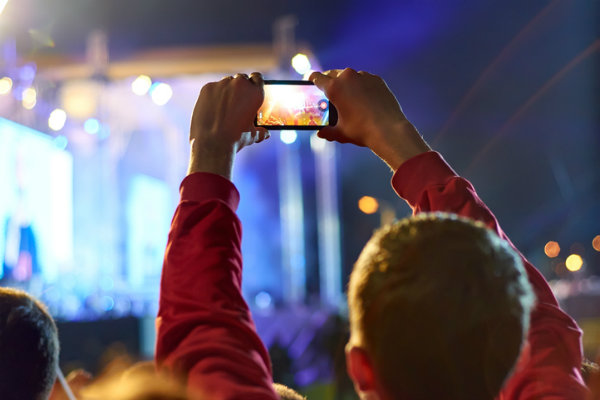
Copyright Law: Can a Comedian Sue His Fans for Telling His Jokes?
Louis Székely, who goes by the stage name Louis CK, is no stranger to controversy. Allegations of sexual misconduct against the comedian emerged in 2017, leading to the cancellation of projects and a nine-month hiatus from standup comedy. Then on December 31, 2018, a member of the audience secretly recorded Louis CK’s act and posted it on social media. The material included jokes about transgender people, the Parkland school shooting, and other provocative topics that again landed the comedian in hot water.
This led Louis CK to require audience members to place their cell phones in lockable neoprene sleeves to prevent them from recording performances. He is also requiring comedy clubs to share the following copyright notice:
Louis CK owns all rights in the content and materials, including any jokes and sketches (the “Materials”), delivered during his performance. The Materials may not be copied, translated, transmitted, displayed, distributed, or reproduced verbatim (the “Use”), in whole or in part, in any form …. Any Use of the Materials without the express prior written consent of Louis CK is strictly prohibited and shall be subject to all available legal remedies, whether in equity or at law at the cost of anyone who violates this prohibition.
Louis CK is hardly the only entertainer to try to control use of material. Singer Alicia Keys, comedian Dave Chappelle, and other performers have also required audience members to put their smartphones in secure pouches. Singer Ariana Grande has demanded the copyright to any press photos taken at her concerts and requires photographers to obtain her express written permission to use their own photos for journalistic purposes.
It’s understandable that entertainers would seek to prevent their material and images from showing up on social media. However, these actions press against the boundaries of copyright law, which allows for the use of creative works for editorials, commentary, and criticism.
The Limitations of Copyright Law
Copyright law is designed to promote creativity by protecting expression that is original and reduced to some tangible form. In establishing these protections, Article I Section 8 of the Constitution mentions only the “writings” of “authors.” The Copyright Act, 17 U.S.C. § 102 et seq., extends copyright protection to pictures, graphics, sculptures, dramatic works, music, sound recordings, audiovisual works, computer software, and some architectural works, as well as works of literature.
Copyright holders have the exclusive right to:
Copy, distribute, and perform their works
Create derivative works
Authorize others to do any of these things
These rights are counterbalanced by fair use doctrine. Under 17 U.S.C. § 107, the use of a copyrighted work “for purposes such as criticism, comment, news reporting, teaching … , scholarship, or research, is not an infringement of copyright.” The nature of the use, the amount of the work used, the nature of the work, and the potential impact on the market value of the work are factors that are considered in determining fair use.
Louis CK’s sweeping prohibition of any use of his material appears to run counter to fair use principles. If the use is not commercial, but rather to report on or critique the comedian’s act, fair use likely applies.
The Right of Publicity
Ariana Grande’s photography agreement is even more problematic in that it seeks to control journalistic use. Furthermore, photojournalists working for a news organization generally don’t own the copyright in their work and therefore cannot be bound by the terms of the agreement. The National Press Photographers Association and 15 other news and media organizations sent a letter to Grande’s tour company protesting the agreement.
Grande could assert a right of publicity to prohibit unauthorized use of her photographs. This right arises out of common law and is recognized in some states. California, for example, has codified the right of publicity in Civil Code § 3344, which prohibits the use of another person’s name, likeness, voice, or signature for advertising and other commercial purposes without that person’s prior consent. Courts have held that these protections do not extend to celebrity look-alikes and sound-alikes, although other laws may come into play.
Some states protect the right of publicity through unfair competition laws under the theory that unauthorized commercial use of a celebrity’s identity creates the false impression that the celebrity produced or endorsed the advertised product. Section 1125 of the Lanham Act, 15 U.S.C. § 1125, might also apply in this context, but trademark law is designed to prevent misrepresentation of products, not to protect celebrities from commercial exploitation of their identities.
Can Louis CK Sue You for Telling His Jokes?
It’s not likely, unless you do so for profit. Nor can Ariana Grande realistically prevent photojournalists from using their own images of her if the use does not constitute misrepresentation. Unless Congress modifies the Copyright Act, or passes federal right of publicity legislation, entertainers will have to accept the fact that their material and likenesses may be used without their consent.
Learn More About Copyright Law
To learn more about copyright law, visit the U.S. Copyright Office. They have a page dedicated to resources and education, which you may find helpful. You will find additional information on the site of the Copyright Society of the USA, a nonprofit devoted to copyright law awareness and education.
If you're interested in obtaining a legal education, learn more about Purdue Global Law School. We offer two online legal degrees—the Juris Doctor, which trains you to become a California-licensed attorney, and the Executive Juris Doctor, a doctorate in law for those who wish to build their legal expertise. Request more information today.

